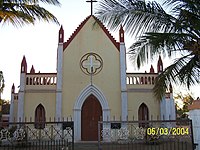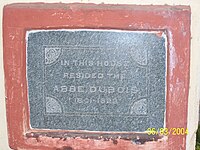
Quick Facts

Biography
Abbe J.A. Dubois or Jean-Antoine Dubois (January 1765 – 17 February 1848) was a French Catholic missionary in India, and member of the 'Missions Etrangères de Paris'. He authored the book, Hindu manners, customs and ceremonies, a valuable work of Indology. He is remembered locally for having adopted the way of life, clothing, food (vegetarianism) and language typical of a Hindu monk or renunciate, and to have thereby earned the trust and respect of the local people. However, he failed in his mission of converting Indians to Christianity, and often expressed the opinion, in writing and in conversation, that the project of bringing the Indians to Christ is doomed to failure.
Early life
Dubois was baptized on 10 January 1766 at Saint-Remèze, in Ardèche, now in south-central France. He was ordained in the diocese of Viviers in 1792, and sailed for India that same year, as an MEP missionary.
Career
In India
In India, Dubois was at first attached to the Pondicherry mission, and worked in the southern districts of the present Madras Presidency. After the fall of Seringapatam in 1799, he went to Mysore to reorganize the Christian community that had been shattered by Tipu Sultan.
He abjured European society, adopted the native style of clothing, and made himself in habit and costume as much like a Hindu as he could. He used to go around in the garb of sanyasi and abstained from eating meat for many years.
He was credited with the founding of agricultural colonies and the introduction of vaccination as a preventive of smallpox. He also caused a church to be built in Seringapatam, known in his honour as the "Abbe Dubois Chapel."
He was known as Fraadh Saaibh to the parishioners of the Holy Cross Church, Cordel in Mangalore, among whom he ministered, and as Dodda Swami-avaru in the Mysore region.
Rev. Elijah Hoole of the Wesleyan Mission records meeting Abbe Dubois on Saturday 4 August 1821 at Seringapatam. He describes the Abbe as being dressed in Muslim or Turkish clothes. The Abbe complains about many of his followers being forced to convert to Islam by Tipu Sultan. Having gained proficiency in local languages and customs, the Abbe gained respect among the locals. In his conversion with Elijah, the Abbe expressed the view that India was incapable of accepting Christianity and advised Elijah to return to England at the earliest.
Later career
Dubois left India in January 1823, with a special pension conferred on him by the East India Company. On reaching Paris, he was appointed director of the Missions Étrangères de Paris, of which he afterwards became superior (1836-1839). He translated into French the famous book of Hindu fables called Panchatantra, and also a work called The Exploits of the Guru Paramartha.
Writings on Indology
Hindu Manners, Customs and Ceremonies
His most notable was his record of Hindu manners, customs and ceremonies. Although Dubois disclaimed the title of author, his collections were not so much drawn from the Hindu sacred books as from his own careful and vivid observations, and it is this, united to a remarkable prescience, that makes his work so valuable. It is divided into three parts:
- A general view of society in India, and especially of the caste system
- The four states of Brahminical life
- Religious practices — festivals, feasts, temples, objects of worship
Dubois's French manuscript was purchased for eight thousand rupees by Lord William Bentinck for the British East India Company in 1807. In 1816, an English translation was published, and about 1864, a curtailed reprint of this edition was issued. Abbé, however, largely recast his work, and in 1897, this revised text (now in the India Office) was published in an edition with notes by H. K. Beauchamp.
Sylvie Murr has claimed that Dubois' Hindu Manners, Customs and Ceremonies was derived from Gaston-Laurent Cœurdoux's original manuscript, Mœurs et coutumes des Indiens, now lost.
Other writings
Of much interest was his Letters on the State of Christianity in India, in which he asserted his opinion that under existing circumstances, there was no possibility of "overcoming the invincible barrier of Brahminical prejudice" so as to convert the Hindus to any sect of Christianity. He acknowledged that low castes and outcastes might be converted in large numbers, but of the higher castes, he wrote: "Should the intercourse between individuals of both nations, by becoming more intimate and more friendly, produce a change in the religion and usages of the country, it will not be to turn Christians that they will forsake their own religion, but rather ... to become mere atheists."
Abbe Dubois Chapel, Seringapatam
Abbe Dubois Chapel, Seringapatam
Memorial Plaque
Bell Tower
Church Bell




